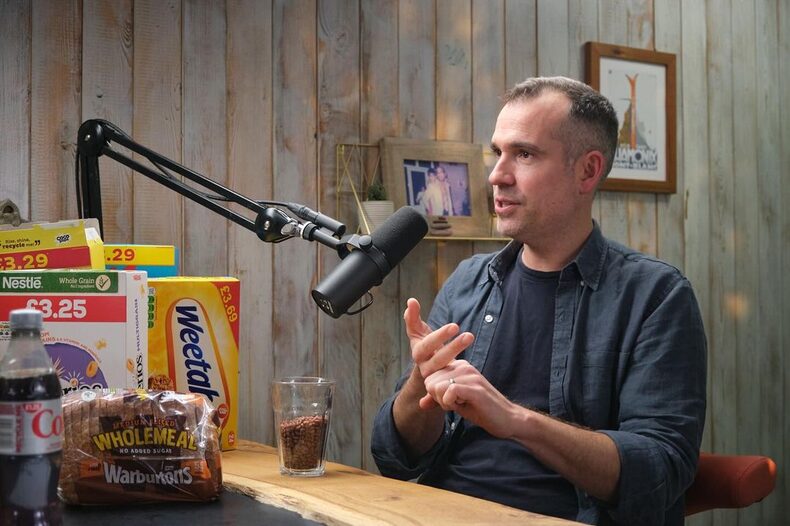Chris van Tulleken, a physician and academic at University College, assured that the food and tobacco industries have no similarities, but rather “they are the same thing.”
THE ultra-processed foods (UPF) have acquired a leading role in the diet millions of people, notably because they are attractive to consumers, easy to obtain and have a long shelf life.
However, the scientific community has been warning for years that the consumption of this type of product is directly associated with increased risk of suffering from health such as obesity, cancer, heart disease and even premature death.
Today, a British doctor stresses that to prevent ultra-processed foods from continuing to harm public health, they should receive the same treatment as cigarettes. .
It is about Chris van Tulleken infectious specialist at the London Hospital for Tropical Diseases, academic at University College and author of Ultratransformed People: Why We Eat Things That Aren’t Food and Why We Can’t Stop Eating Them.
Tulleken said in an interview with the BBC that at first he didn’t really believe in the concept of ultra-processed foods and their risks, but that changed after conducting research where he dedicated himself to eating only these types of products. The findings from this experience are reflected in his book.
What are ultra-processed foods?
Ultra-processed foods include those foods and beverages that have undergone multiple processes and are formulated primarily from industrial ingredients, which contain little or no natural nutrients as described by World Health Organization .
Its composition is mainly based on sugars, saturated fats, sodium and oils and are low in protein, vitamins, fiber and minerals.

To make them tastier or mimic the qualities of other foods, UPFs usually include additives such as preservatives, stabilizers, flavors, volume enhancers, colorings and flavor enhancers .
Some of the most common ultra-processed foods are sugary drinks, salty snacks, cereals, juices, biscuits, sausages, processed meats, cakes, chips and “ready-to-heat” products, the company says. WHO.
Why ultra-processed foods should get the same treatment as cigarettes, says expert
In an interview with the BBC, Dr van Tulleken explained that the food and tobacco industries have no similarities, but rather “they are the same thing”.
His remarks are due to the fact that in the 1980s, RJ Reynolds, one of the largest tobacco companies in the world, decided to buy the Nabisco food company. This coincided with the tobacco industry’s Philip Morris’ acquisition of the food company General Foods.
They are “the same conglomerates”, although the companies have undergone changes over the past decades.
“They use the same molecules tested in the laboratory for cigarettes, like flavorings, in foods. “They use the same marketing techniques and distribution networks to sell addictive and harmful foods, just as they did with cigarettes. » argues the British doctor.
The ultra-processed food sector
During the interview, van Tulleken pointed out that the food industry offers weight gain foods because that is the only way to get their profits and million dollar profits. “Imagine a food company that sells food that satisfies people. In other words, consumers would not need to purchase large quantities, but only what is necessary. How could this company be competitive? » he adds.

Amid the rise of ultra-processed foods and increasing obesity, the doctor says it makes sense that pharmaceutical companies are popping up with new weight-loss drugs. While he believes it works “relatively well” to help people, he does not address the cause: what we eat.
“We should never let people get sick and then treat them. It would be much cheaper and more effective to improve children’s diets, regulate the food industry and encourage everyone to live healthily,” he says.
And are there any countries that have managed to make their regulations regarding ultra-processed foods work? This is what the academic from University College London thinks and, curiously, all these countries are in Latin America. It is about from Chile, Mexico and Argentina who “have very good policies in this regard”.
“We must use the same means as those used to combat smoking. We need a warning system on packaging that is bigger than company or product logos. We need to aggressively tax the worst foods. We must ban all types of advertising and also prohibit its sale to children,” says the expert.
Source: Latercera
I’m Rose Brown , a journalist and writer with over 10 years of experience in the news industry. I specialize in covering tennis-related news for Athletistic, a leading sports media website. My writing is highly regarded for its quick turnaround and accuracy, as well as my ability to tell compelling stories about the sport.


